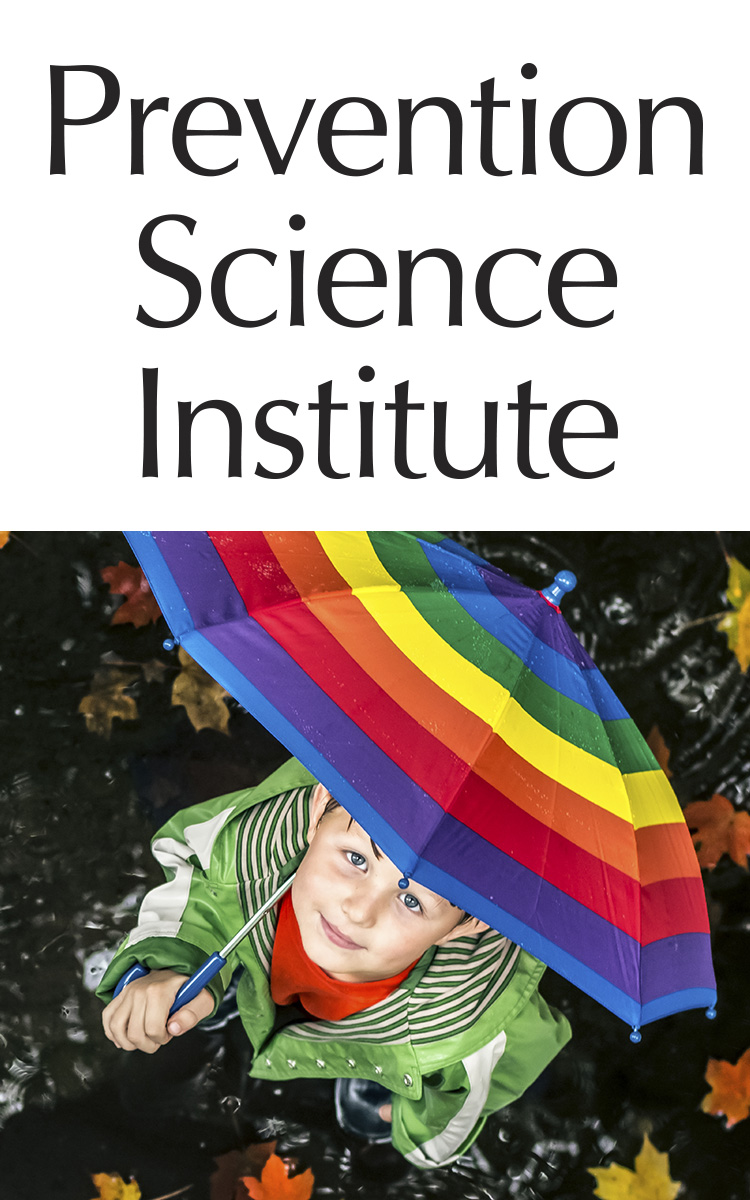UO Faculty
 Nicholas Allen, PhD, uses a developmental psychopathology approach to understand how children and adolescents are affected by their environments. He focuses on how family interactions and other aspects of the child’s environment influence the child’s emotional functioning and affect the development of the biological systems associated with these emotions.
Vita
Nicholas Allen, PhD, uses a developmental psychopathology approach to understand how children and adolescents are affected by their environments. He focuses on how family interactions and other aspects of the child’s environment influence the child’s emotional functioning and affect the development of the biological systems associated with these emotions.
Vita
 Liz Budd, PhD, is an assistant professor in the Department of Counseling Psychology and Human Services. She also works with the Prevention Science Institute and will primarily teach in the prevention science concentration within the College of Education. Budd's work has focused on obesity and chronic disease prevention, primarily through physical activity promotion, especially among girls and adolescents. She is also interested in dissemination and implementation science in school and neighborhood settings. She has a Ph. in social work from Washington University in St. Louis, a master’s in public Health from St. Louis University, and a bachelor of science in sociology and Spanish studies from Santa Clara University. Budd is currently wrapping up an R21 that examines cross-country factors that influence the implementation of evidence-based chronic disease prevention interventions in Australia, Brazil, China and the United States. She is also preparing a collaborative project with the Center on Teaching and Learning and several community organizations to study an innovative technology-based physical activity promotion intervention in rural school settings.
Liz Budd, PhD, is an assistant professor in the Department of Counseling Psychology and Human Services. She also works with the Prevention Science Institute and will primarily teach in the prevention science concentration within the College of Education. Budd's work has focused on obesity and chronic disease prevention, primarily through physical activity promotion, especially among girls and adolescents. She is also interested in dissemination and implementation science in school and neighborhood settings. She has a Ph. in social work from Washington University in St. Louis, a master’s in public Health from St. Louis University, and a bachelor of science in sociology and Spanish studies from Santa Clara University. Budd is currently wrapping up an R21 that examines cross-country factors that influence the implementation of evidence-based chronic disease prevention interventions in Australia, Brazil, China and the United States. She is also preparing a collaborative project with the Center on Teaching and Learning and several community organizations to study an innovative technology-based physical activity promotion intervention in rural school settings.
 Allison Caruthers, PhD, is interested in adolescent gender and sexual socialization and their relationship to sexual behavior, sexual risk taking, and emotional well-being in adolescence and adulthood. She is examining the distinction between normal, healthy sexual exploration and truly problematic behavior, as well as possible mechanisms by which intervention services reduce risky sexual behavior.
Vita
Allison Caruthers, PhD, is interested in adolescent gender and sexual socialization and their relationship to sexual behavior, sexual risk taking, and emotional well-being in adolescence and adulthood. She is examining the distinction between normal, healthy sexual exploration and truly problematic behavior, as well as possible mechanisms by which intervention services reduce risky sexual behavior.
Vita
 Krista Chronister, PhD, focuses her research on partner violence prevention and community-based intervention, including women survivors’ economic and vocational development, community mental health interventions with ethnic minority and immigrant families experiencing partner violence, and young adults at risk for partner violence and substance use.
Vita
Krista Chronister, PhD, focuses her research on partner violence prevention and community-based intervention, including women survivors’ economic and vocational development, community mental health interventions with ethnic minority and immigrant families experiencing partner violence, and young adults at risk for partner violence and substance use.
Vita
 Jessica M. Cronce, PhD, is interested in how alcohol use and other health-related behaviors overlap and interact to predict risk among young adults and how to prevent or lessen those harms. She is evaluating motivational enhancement–based preventive approaches and assessing how marijuana legalization affects young adult cannabis use.
Jessica M. Cronce, PhD, is interested in how alcohol use and other health-related behaviors overlap and interact to predict risk among young adults and how to prevent or lessen those harms. She is evaluating motivational enhancement–based preventive approaches and assessing how marijuana legalization affects young adult cannabis use.
 Brian Danaher, PhD, is interested in developing and evaluating self-management interventions designed to encourage health behavior change, especially programs delivered using technology. Much of his research has focused on controlled tests of eHealth interventions and related themes, such as recruitment, participant engagement, imputing missing data, and implementation/dissemination issues. Vita.
Brian Danaher, PhD, is interested in developing and evaluating self-management interventions designed to encourage health behavior change, especially programs delivered using technology. Much of his research has focused on controlled tests of eHealth interventions and related themes, such as recruitment, participant engagement, imputing missing data, and implementation/dissemination issues. Vita.
 Dave DeGarmo, PhD, is interested in substantive evaluation of family stress models and in program evaluation of preventive intervention and treatments for families at risk for compromised parenting. His active research involves an intervention for divorced fathers and multimodel comparisons of interventions for military parents. A major focus is on independent and interactive effects of fathering.
Vita.
Dave DeGarmo, PhD, is interested in substantive evaluation of family stress models and in program evaluation of preventive intervention and treatments for families at risk for compromised parenting. His active research involves an intervention for divorced fathers and multimodel comparisons of interventions for military parents. A major focus is on independent and interactive effects of fathering.
Vita.
 Andy Garbacz, PhD, is interested in promoting positive social behavior outcomes and supporting learning among children and adolescents by partnering families and educators to create sustainable systems of support. His research examines prevention and intervention programs that support children’s learning and behavior within a tiered framework.
Vita
Andy Garbacz, PhD, is interested in promoting positive social behavior outcomes and supporting learning among children and adolescents by partnering families and educators to create sustainable systems of support. His research examines prevention and intervention programs that support children’s learning and behavior within a tiered framework.
Vita
 Nicole Giuliani, PhD, joined the faculty of the School Psychology program in the Department of Special Education and Clinical Sciences. Her research focuses on better understanding the affective, cognitive, and neural mechanisms underlying food craving, consumption, and self-regulation, with the goal of improving those processes in individuals at risk for adverse health outcomes through targeted interventions. Nicole received her PhD from Stanford University, and completed her post-doctoral training in the Psychology Department at UO.
Nicole Giuliani, PhD, joined the faculty of the School Psychology program in the Department of Special Education and Clinical Sciences. Her research focuses on better understanding the affective, cognitive, and neural mechanisms underlying food craving, consumption, and self-regulation, with the goal of improving those processes in individuals at risk for adverse health outcomes through targeted interventions. Nicole received her PhD from Stanford University, and completed her post-doctoral training in the Psychology Department at UO.
 Randy Kamphaus, PhD, professor and dean of the College of Education at UO, has focused his research on the development of better measures for assessing and diagnosing child and adolescent mental health disorders. During the past decade his research has shifted to developing measures to improve early detection of mental health risk or subsyndromal psychopathology. He and colleagues are creating and conducting field trials of school-based secondary prevention programs for mitigating risk.
Randy Kamphaus, PhD, professor and dean of the College of Education at UO, has focused his research on the development of better measures for assessing and diagnosing child and adolescent mental health disorders. During the past decade his research has shifted to developing measures to improve early detection of mental health risk or subsyndromal psychopathology. He and colleagues are creating and conducting field trials of school-based secondary prevention programs for mitigating risk.
 Nichole Kelly, PhD, is an assistant professor in the Department of Counseling Psychology and Human Services. Her appointment is one of four new hires in the cluster of appointments in the obesity prevention initiative in the Prevention Science Institute. Her program of research focuses on eating behavior phenotypes associated with excess weight gain across the lifespan. The specific goals of her research are to: 1) clarify emotional and cognitive factors associated with disinhibited eating; 2) identify mechanisms for disinhibited eating; and 3) use these data to inform the development of novel interventions aimed at modifying these underlying processes. Sociocultural influences and measurement issues are additional common threads seen throughout Nichole’s investigations. Prior to joining the UO, Nichole was a postdoctoral research fellow in a joint position at the Uniformed Services University (USU) and the National Institutes of Health (NIH). Nichole has previous teaching experience in the psychology of women and research methods, and has a special interest in mentoring burgeoning social scientists.
Nichole Kelly, PhD, is an assistant professor in the Department of Counseling Psychology and Human Services. Her appointment is one of four new hires in the cluster of appointments in the obesity prevention initiative in the Prevention Science Institute. Her program of research focuses on eating behavior phenotypes associated with excess weight gain across the lifespan. The specific goals of her research are to: 1) clarify emotional and cognitive factors associated with disinhibited eating; 2) identify mechanisms for disinhibited eating; and 3) use these data to inform the development of novel interventions aimed at modifying these underlying processes. Sociocultural influences and measurement issues are additional common threads seen throughout Nichole’s investigations. Prior to joining the UO, Nichole was a postdoctoral research fellow in a joint position at the Uniformed Services University (USU) and the National Institutes of Health (NIH). Nichole has previous teaching experience in the psychology of women and research methods, and has a special interest in mentoring burgeoning social scientists.
 Atika Khurana, PhD, is interested in understanding the onset of health risk behaviors during adolescence. She uses an ecological systems approach to examine the interplay of individual and environmental risk and protective factors as they relate to adolescent substance use, risky sexual behaviors, academic disengagement, and mental health problems.
Vita
Atika Khurana, PhD, is interested in understanding the onset of health risk behaviors during adolescence. She uses an ecological systems approach to examine the interplay of individual and environmental risk and protective factors as they relate to adolescent substance use, risky sexual behaviors, academic disengagement, and mental health problems.
Vita
 Derek Kosty, PhD, studies problematic substance use across the lifespan, effects of academic and behavioral interventions, and applied quantitative research methods. His methodological expertise includes group- and single-case designs, advanced statistical modeling of longitudinal and multilevel data, and structural equation modeling with latent variables.
Derek Kosty, PhD, studies problematic substance use across the lifespan, effects of academic and behavioral interventions, and applied quantitative research methods. His methodological expertise includes group- and single-case designs, advanced statistical modeling of longitudinal and multilevel data, and structural equation modeling with latent variables.
 Leslie Leve, PhD, associate director of the Prevention Science Institute, focuses her research on interventions to prevent risk behaviors and improve well-being for youths in foster care and youths in the juvenile justice system, and adoption studies that examine the interplay between biological (genetic, hormonal), family, and contextual influences on development.
Vita
Leslie Leve, PhD, associate director of the Prevention Science Institute, focuses her research on interventions to prevent risk behaviors and improve well-being for youths in foster care and youths in the juvenile justice system, and adoption studies that examine the interplay between biological (genetic, hormonal), family, and contextual influences on development.
Vita
 Laura Lee McIntyre, PhD, is interested in early identification and treatment of childhood developmental and behavioral problems, with an emphasis on the systems of care that support children at risk for negative social, emotional, and behavioral outcomes. Specific research involves parent training, education, and support; transition to kindergarten; and family well-being. Vita
Laura Lee McIntyre, PhD, is interested in early identification and treatment of childhood developmental and behavioral problems, with an emphasis on the systems of care that support children at risk for negative social, emotional, and behavioral outcomes. Specific research involves parent training, education, and support; transition to kindergarten; and family well-being. Vita
 Kevin Moore, PhD, has focused his professional and scientific career on the development and implementation of evidence-based and evidence-informed behavioral health treatments for children, youths, and families. He has extensive experience in researching, implementing, clinically supervising, and consulting on evidence-based treatments for externalizing and internalizing disorders across educational, community-based mental health, social welfare, residential, and juvenile justice settings. Vita
Kevin Moore, PhD, has focused his professional and scientific career on the development and implementation of evidence-based and evidence-informed behavioral health treatments for children, youths, and families. He has extensive experience in researching, implementing, clinically supervising, and consulting on evidence-based treatments for externalizing and internalizing disorders across educational, community-based mental health, social welfare, residential, and juvenile justice settings. Vita
 John Seeley, PhD, is a professor in special education and clinical sciences. His research interests include emotional and behavioral disorders, behavioral health intervention, research design and program evaluation, and health-related technology. He is especially interested in school-based screening, prevention, and treatment for internalizing psychopathology.
John Seeley, PhD, is a professor in special education and clinical sciences. His research interests include emotional and behavioral disorders, behavioral health intervention, research design and program evaluation, and health-related technology. He is especially interested in school-based screening, prevention, and treatment for internalizing psychopathology.
 Samantha Shune, PhD, focuses her research on mitigating the deleterious effects of healthy and of pathologic aging on eating and mealtime processes. Her research and clinical work as a speech–language pathologist focus on integrating the physiologic components of swallowing with a holistic view of the mealtime process.
Vita
Samantha Shune, PhD, focuses her research on mitigating the deleterious effects of healthy and of pathologic aging on eating and mealtime processes. Her research and clinical work as a speech–language pathologist focus on integrating the physiologic components of swallowing with a holistic view of the mealtime process.
Vita
 Elizabeth Skowron, PhD, studies the effects of early adversity on the development of self-regulation skills in early childhood and how biology and behavior shape parenting processes. Her team delivers evidence-based family interventions that reduce risk of child abuse and neglect and studies the biobehavioral pathways through which interventions result in positive outcomes.
Vita
Elizabeth Skowron, PhD, studies the effects of early adversity on the development of self-regulation skills in early childhood and how biology and behavior shape parenting processes. Her team delivers evidence-based family interventions that reduce risk of child abuse and neglect and studies the biobehavioral pathways through which interventions result in positive outcomes.
Vita
 McKay Moore Sohlberg, PhD, CCC-SLP, specializes in research to develop and evaluate interventions for deficits in attention, memory, and executive functions following acquired brain injury. She is particularly interested in treatments that mitigate cognitive effects for individuals with brain injury in the postacute phase, including those pursuing postsecondary education following brain trauma.
McKay Moore Sohlberg, PhD, CCC-SLP, specializes in research to develop and evaluate interventions for deficits in attention, memory, and executive functions following acquired brain injury. She is particularly interested in treatments that mitigate cognitive effects for individuals with brain injury in the postacute phase, including those pursuing postsecondary education following brain trauma.
 Emily Tanner-Smith, PhD, studies the effectiveness of prevention and treatment programs for substance use, delinquency, and other mental health problems. Her research uses meta-analytic methods to advance evidence-informed prevention programming, with a particular emphasis on understanding variability in the effectiveness of interventions across diverse populations and contexts.
Emily Tanner-Smith, PhD, studies the effectiveness of prevention and treatment programs for substance use, delinquency, and other mental health problems. Her research uses meta-analytic methods to advance evidence-informed prevention programming, with a particular emphasis on understanding variability in the effectiveness of interventions across diverse populations and contexts.
 Beth Stormshak, PhD, director of the Prevention Science Institute, has expertise in the area of prevention, including prevention of substance use, problem behavior, and later mental health problems in children and youths. Her research focuses on the development of family-centered, model-driven interventions designed to reduce problem behavior and promote successful developmental transitions. She has served as the principal investigator on multiple grants, including randomized trials that tested the efficacy and effectiveness of family-centered models of prevention to reduce risk behavior in early childhood, in school-age children, and in adolescents, with a primary focus on enhancing parenting skills and behavioral management.
Vita
Beth Stormshak, PhD, director of the Prevention Science Institute, has expertise in the area of prevention, including prevention of substance use, problem behavior, and later mental health problems in children and youths. Her research focuses on the development of family-centered, model-driven interventions designed to reduce problem behavior and promote successful developmental transitions. She has served as the principal investigator on multiple grants, including randomized trials that tested the efficacy and effectiveness of family-centered models of prevention to reduce risk behavior in early childhood, in school-age children, and in adolescents, with a primary focus on enhancing parenting skills and behavioral management.
Vita


